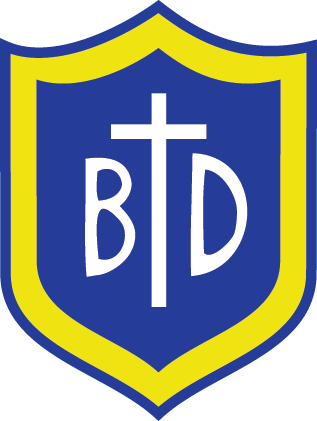English Reading
English Reading Vision
At Blessed Dominic Catholic Primary School, we believe that reading is a key life skill and is one of the main skills that unlocks a remarkable world of learning for our pupils alongside many enchanting and alternative worlds through fiction.
We want every child to develop sound reading skills so that they can take advantage of opportunities, responsibilities and experiences in their current and later life. By promoting high standards of reading as a communication tool across the curriculum, children recognise its pivotal place in their successful learning. To ensure pupils succeed and make progress from their starting points, we are dedicated to enabling our pupils with essential characteristics to ensure they become skilful, sound and independent readers.
We aim to develop children to decode words and read fluently with good understanding, to develop the habit of reading widely (for both pleasure and information) and to acquire a wide vocabulary including an understanding of grammar and knowledge of language patterns. At Blessed Dominic, we pride ourselves on being a culturally diverse family. Pupils are encouraged to appreciate our rich and varied literary heritage through resources in school and outside our community, including the use of our local library. We aim to inspire pupils using cross-curricular methods wherever appropriate to demonstrate how reading underpins the wider curriculum.
Characteristics of a Reader
At Blessed Dominic Catholic Primary School, we are readers. We…
- read easily, fluently and with good understanding,
- read widely across both fiction and non-fiction to develop knowledge of ourselves and the world we live in,
- develop the habit of reading widely and often, for both pleasure and information,
- acquire a wide vocabulary, an understanding of grammar and knowledge of linguistics,
- ask relevant questions to extend their understanding and knowledge,
- clarify the meanings of unknown words and words with more than one meaning,
- articulate and justify answers, arguments and opinions,
- read books to appreciate our rich and varied literary heritage,
- use discussion in order to learn by elaborating and clearly explaining our understanding and ideas,
- participate in opportunities to develop our oracy, including drama and speaking aloud,
- learn how to make formal presentations and participate in debates confidently,
- demonstrate an appreciation and love for reading.
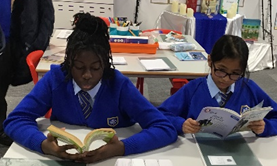
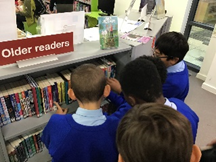
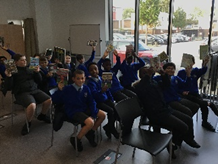
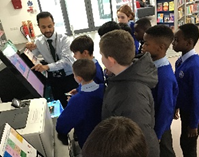
What does this look like at Blessed Dominic Catholic Primary School in…
EYFS
We begin our children’s reading journey in Nursery where we teach them a variety of skills. These early reading skills include matching, rhyming, awareness of phonics and the skills associated with language development, such as listening, attention, alliteration and sound discrimination.
In Reception, children are introduced to phonics within the first two weeks. All children are taught phonics following Little Wandle Letters and Sounds Revised. This marks the start of a structured and systematic approach to the teaching of synthetic phonic work and grapheme-phoneme. The process of segmenting and blending whole words and selecting letters to represent those phonemes is taught. LW flash cards are used to enable children to form a concrete image of how to write letters. During this phase, the children are also introduced to reading and spelling common and tricky words. Home reading books are closely aligned to the pupils’ phonics phase and coverage, so books can be independently decoded.
KS1
Pupils recognise that the letters on the page represent set sounds in spoken words. As a result, pupils develop accurate and automatic word recognition and decoding skills. Pupils build upon word recognition and decoding skills to include understanding of word meaning and comprehension of what they have just read. Pupils rely on the information relayed in the text and their own knowledge of the world for meaning and understanding. Pupils are encouraged to read widely and are exposed to both fiction and non-fiction texts. This also increases pupils’ vocabulary and understanding of language patterns in reading.
Pupils ask and answer questions and participate in discussions about reading, using parts of the text to show what they know and understand as a result of reading it.
KS2
Pupils read silently at an age-appropriate level and texts are decoded accurately and at a sufficient speed to focus on understanding rather than word decoding. Pupils aim towards effortless but accurate reading. Pupils continue to build upon their reading skills by reading more widely and with increased stamina. Teachers monitor pupils’ reading books to ensure pupils are regularly reading age-appropriate and challenging texts.
Texts offer pupils challenge through vocabulary and develop reading breadth and coverage of genres in class. Pupils are able to identify different purposes and approaches for different genres and materials, including the difference between reading for entertainment and reading for knowledge/research.
Pupils are able to infer from what they have read, ranging from word meanings to events and should be able to demonstrate their understanding of their reading through summarising, answering comprehension based questions accurately and drawing on relevant evidence from the text to support their ideas.
Memorable experiences and whole school events
Pupils are taught the Programme of Study through exciting lessons which engage and engross pupils so that they absorb the learning and retain it. Carefully selected reading materials reflect the interests of the pupils and, where appropriate, offer pupils the chance to continue self-led reading, e.g. the beginning of a series of books. Whole school events, such as World Book Day, book fairs, reading workshops and reading buddies encourage children to apply their skills in a variety of ways but also offer enjoyment to pupils based upon their reading across the school.
Cross Curricular
Teachers are encouraged to make links with other areas of the curriculum so that reading, decoding and comprehension skills can be embedded and pupils identify how reading is a fundamental key that unlocks content and understanding of other subjects.
Trips and extra-curricular opportunities
Trips and visitors will enhance learning. It will provide pupils with memorable experiences and enhance their learning experience. Trips and visitors are planned as part of a wide and engaging curriculum to showcase reading for pleasure and reading skills. Competitions that Blessed Dominic are taking part in, such as Poetry by Heart and Biblio-Buzz, will encourage pupils to develop a love for reading and improve their oracy skills.
Planning
Teachers plan lessons as a whole staff to ensure progression of skills and ensure that teaching is providing memorable experiences and knowledge and professional experience can be shared.
Assessment
Assessments take the form of reading tests (Renaissance Star Reading and NFER), conversations in class based on reading during lessons, and teacher assessment throughout the half-term based on word recognition and comprehension skills. English lead monitors half termly standards in the subject across all year groups.
Challenge
All pupils, especially those with sound understanding, will be challenged and given the opportunity to deepen and broaden their learning. Teachers will give all pupils the opportunity to apply their skills in lessons independently.
Impact
At Blessed Dominic Catholic Primary School, we measure the impact of our curriculum through the following methods:
Pupil Voice
Pupils will show through questionnaires, pupil conferencing and focus groups their understanding and enjoyment of reading in all year groups. Involvement in events and activities that are run in line alongside national events e.g. World Book Day also indicates pupils’ enjoyment and engagement with reading. English leader lesson observations include opportunities for pupil voice collection and from pupil surveys, when appropriate, during the year.
Evidence
Pupils will be able to apply and demonstrate they can effectively use reading skills with tasks appropriate to them. They will progress throughout the year groups building upon these skills and reflect the planned outcomes. In class reading tests and End of Key Stage tests will highlight skill areas that children excel in and areas requiring more practise.
Outcomes
Reading impact goes beyond measureable results as reading is the key to all learning and so pupils’ enjoyment of school in general is improved through their reading skills. All children gain the opportunity to enter enchanting and exciting worlds through books and reading for pleasure will also highlight how children are becoming successful and life-long readers. To support this intention, we ensure our phonics and reading curriculums are of high quality, are well-thought-out and are planned to demonstrate progression. If children are keeping up with the curriculum, they are deemed to be making good or better progress.
At the end of EYFS, pupils will be able to more fluently read and understand simple sentences. Pupils will use their phonic knowledge to independently decode regular words speedily and read them aloud accurately. Pupils will speedily read common irregular words without using sounding out methods. When discussing what they have read, pupils will show accurate understanding and ideas. These foundational skills will help pupils focus on developing their phonetical knowledge and comprehension skills in KS1.
In Year 1, children will pass the phonics word decoding test and be in line with year group expectations. As a result, pupils can continue to focus upon their vocabulary and comprehension skills as they move up the school.
For KS2 pupils, throughout each year group pupils will be taught and demonstrate the skills outlined in the National Curriculum documents. By the end of KS2 pupils should achieve the standardised score of 100 or above in the reading paper. For pupils working below the year group level, teachers target learning to ensure progress within the pupil’s working level. As a result, children will become independent readers who choose to read often and widely. They will have preferred interests of reading but will be able to seek information and enjoyment from other sources.
